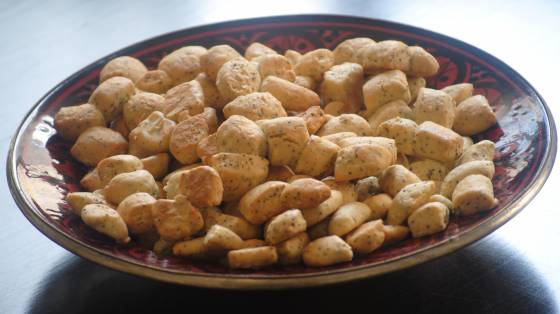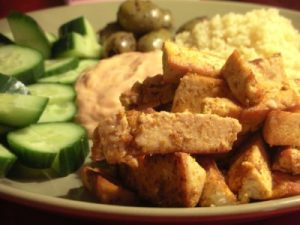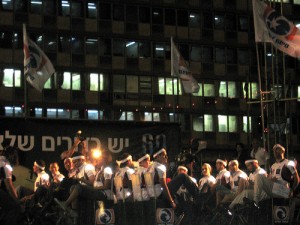 Crunchy, just-sweet-enough tidbits that perfectly match a hot cuppah.
Crunchy, just-sweet-enough tidbits that perfectly match a hot cuppah.
Hospitality is a fine art in the Middle East, with traditions to dictate every gesture. A guest will always be offered tea, coffee, and one or more old-fashioned sweets, like kanafeh pastry, or silky malabi, or light fekka cookies. The traditional fekka is baked twice, like biscotti, and like those Italian cookies, is just sweet enough to satisfy. This easy variation makes nugget-sized cookies that bake up only once.
Moroccan Fekka Cookies
Ingredients:
2 eggs, beaten
1/2 cup sugar
3 tablespoons melted butter
3 tablespoons neutral-flavored vegetable oil
2 tablespoons orange-flower water
1 teaspoon baking powder
1/8 teaspoon salt
2 – 2-1/4 cups flour
4 tablespoons anise, sesame, or poppy seeds, or a mixture of seeds
Notes:
You may omit the butter and use all vegetable oil.
If using whole wheat flour, you will probably need only 2 cups. Not traditional, but very good, is to use brown sugar instead of white.
In a large bowl, mix the eggs, sugar, fats, orange flower water, salt, and baking powder. Add the flour and seeds.
Stir to make a soft dough, then knead it briefly. Add flour by tablespoons to keep it manageable, but do not add so much as to make the dough stiff. It should remain slightly sticky.
Remove balls of dough the size of an egg, and roll them on a lightly-floured surface to make “snakes” 1″ – 2 cm. thick. Place all the rolled dough “snakes” on a baking sheet lined with parchment paper. Do not allow them to touch. Cover and freeze for an hour to stiffen the dough.
Preheat the oven to 400° F – 200° C.
Slice the “snakes” into pieces about 1/2″ – 1 cm. thick, separating the pieces with the knife blade so that they bake evenly all over. Bake 12-15 minutes, checking at 12 minutes for a light brown color.
Cool the fekkas on the same baking sheet for a few minutes, then scoop them out carefully onto a rack. Once cooled, fekkas may be stored for two weeks.
More beguiling Middle-Eastern delicacies on Green Prophet:
Baba Ganoush
Fesenjan, Persian Chicken in Walnut Sauce
Photo of fekka cookies by Miriam Kresh.




Yosefa, hardly. Being a three-time grandmother myself…
Miriam – did you just insult grandmothers?
Yosefa, Pereg has orange blossom and rose petal waters. Ask for mei zohar and mei vradim. You can get either a fragrant water or a concentrated liquid in a tiny bottle. And yes, if you pick blossoms, you are destroying future oranges. But as so many people neglect their trees so that by autumn the ground is covered with rotting fruit…
Karin, if you’re brave enough to distill your own orange flower water, I’m impressed. It used to be the job of the grandmother of the house, so it can’t be rocket science – but unless someone experienced shows me how to do it, I won’t.
If I pick blossoms am I stealing future oranges?
I was just reading about the 2000 yr old date pit, when GP popped up to recommend this recipe. Where can I get orange blossom water? I’ve checked Pereg and other spice shops. Does it have a unique Hebrew name?
Oranges are blossoming now. Maybe it’s time to make some?
By the way Miriam, do you say Fekka, not Fekkass?
Karin: It’s probably a Bigaradier alright and it’s there to fertilise your other trees. If you’re not the one who planted it, don’t get rid of it. Your other trees wouldn’t necessarily have the same amount of fruit if it wasn’t there, especially if there are no other citrus trees around… But yeah, if you don’t harvest the flowers you get swamped with fruits that you don’t need. Bees love them too obviously.
A pot still or an alembic is used to distil alcohol too, but I don’t know about your idea. We just macerate the flowers in water then cook them in a pressure cooker (cocotte minute)that has a pipe coming up from its lid. The pipe bends down and passes through another receptacle filled with cold water. Vapour condensates in the section going through the water and drops into a glass receptacle at the end of the pipe, that’s your orange water. I’m not allowed to do it myself, officially because you need much trial and error to get the temperature and water to flower ratio right etc… but I think it’s because everyone thinks I’d manage to blow the stuff up or something, they’re probably right 🙂
You might try this: http://moroccanfood.about.com/od/tipsandtechniques/ht/oran_flow_water_recipe.htm But I have no idea if it works.
My favourite qrishlet, you omit the sugar and seeds, and add instead salt, paprika, chili powder and finely ground Edam cheese (grate, freeze, then ground)to taste, the rest exactly the same. Or Edam cheese and thyme.
You can omit the seeds and knead cocoa powder into half the dough. Flatten the white dough and cut long rectangles, then the brown dough and try to cut similar rectangles, put them one over the other then roll to make the “snake” as Miriam said. When cut you’ll have a pattern like a snail’s shell 🙂
Ah Argan, were I a buck I’d be offended for my kind! They go around collecting the fruits, braving thorns and gravity, store them for us, then give the nuts back once back home conveniently clear from the flesh of the fruit, and we ungrateful humans after all that hard work go all yuk and yee! I’m in a mind to spread the myth to curb the outside demand though, otherwise an Argan omelette like the one I’m eating now might become too pricey for me! 🙂
Miriam: In Morocco we call these Qrishlet :). They’re made around Ashoura and mixed in large bowls with dries figs, raisins, dates and nuts.
Karin: If you have a Bigaradier in bloom (streets are lines with it here), you harvest the flowers by putting a sheet of cloth underneath and shaking the branches with a long stick. Then use a still to make orange water, they are made here from old pressure cookers. If you have a big tree you can still have enough fruits to make marmalade.
Xoussef,
I have 6 orange trees in my garden and have a huge pot of marmalade in the fridge right now. One tree is heavy from the weight of all the oranges, but they are not a variety that is tasty to eat raw.
They blossom in spring, soon. Can I soak the flowers in a tasteless alcohol to make it work? Is that what you mean by a still?
I love qrishlet. Any more tips? And for the record – what’s the deal with argan oil? Was the argan nut ever “cracked” by a goat digestive tract or is that just a rumor still circulating?
Yes, it is, Faye. Not so much as to be overpowering, though. A nice balance between the flavor of the seeds and the flower water.
These sound good. Is the taste of the orange flower noticeable in the finished cookie?
You have to have many kilos of fresh flower petals, plus a reliable still,Karin. I suggest looking for orange flower water in the shuk, the health food store, or even your local grocery.
How does one make orange flower water?
I love these cookies with tea. Could eat a whole plateful and did after arriving to the Kasbah du Toubkal, where a plate was laid out as a greeting.
http://www.greenprophet.com/2011/07/kasbah-toubkal-morocco/